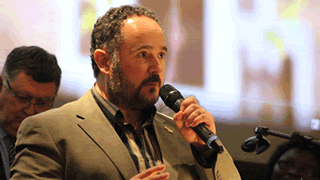Street preacher guilty of using 'threatening' language by quoting Leviticus

A Christian street preacher was today found guilty of using "threatening" language by quoting the Bible when speaking about homosexuality on the streets of Taunton in June last year.
Former paratrooper Mike Overd was convicted under section 5 of the Public Order Act, which concerns causing harassment, alarm or distress by using threatening, abusive or insulting words or behaviour.
The judge at Bristol Crown Court told him that he should not have used the particular verse in the Bible – Leviticus 20:13 – because it uses the word "abomination". The judge suggested that there were other verses he could have chosen if he wanted to talk about what the Bible says about homosexuality.
Libby Towell, spokesperson for the Christian Legal Centre, who represented Overd, said: "The judge is effectively censoring the Bible and saying that certain verses aren't fit for public consumption."
Overd was given a fine of £200, and told to pay £1,200 in costs and compensation. This included a sum for the emotional harm caused to the homosexual man, who is also a Christian, to whom he was speaking when he quoted Leviticus.
He was, however, acquitted of a second charge with regard to comments he made about the prophet Mohammed in a separate incident in July 2014. When talking about religious leaders, Overd said that you could not compare Mohammed with Jesus – adding that if a man marries a nine-year-old girl, "In this country we call that paedophilia"
The complaint was brought by a woman who described herself as a devout Christian, although no Muslims had complained about the comments. The woman said she was offended by the comments and thought it was "inflammatory". However, the judge said that it had failed to be proven.
Overd has been preaching on the streets for more than five years, and this is not the first time he's faced legal action; in 2012 he was acquitted of similar charges.
"There's been a concerted campaign to stop him speaking the word of God on the streets of Taunton," Towell said. "Today was the result that the police had been looking for."
But she added that this would not prevent Overd from preaching on the streets again. "He answers to God," Towell said, adding that he would be seeking legal advice about what he should do next.
Towell said the Christian Legal Centre stood by Overd. "He's not preaching his opinion. He's preaching what God's word says."
Speaking of the wider issue, she said this case marked a "new level" in court action against preaching in public. "It's now going through what the Bible saying that some parts shouldn't be spoken about and might cause emotional harm. It's quite shocking," she said.
She added that this should come as a wake-up call to Christians in the UK to realise what judges are saying about faith in the public square.
But it's not only Christians who are perturbed by this case. In a blog for the National Secular Society last week, Benjamin Jones argued that it would be a threat to the freedom of speech if Overd were found guilty.
"If Overd is found guilty, what possible reason is there for not also banning the scripture which he articulates?" he writes. "This is a preposterous situation. Regardless of their content, do we really want to live in a society where books are banned?"
He continues: "Free speech must be 'free' in the sense of meaning uninhibited, restricted only by prohibition on the incitement to violence or defamation. 'Free' however, is not to imply that speech does not have a cost for society: the price is paid in allowing Mr Overd to set out his stall, and so we take the inconsequential risk that people may be upset by what he says. We must be confident in our values, even if they are at times inconvenient to those of us who find Mr Overd's use of our shared rights to be distinctly unpleasant."











